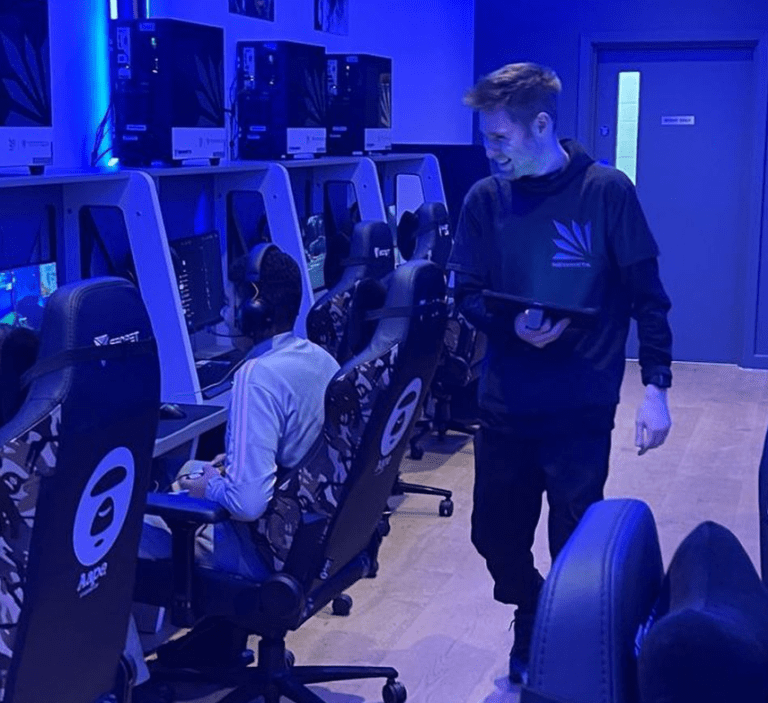Esports, or electronic sports, has emerged as a rapidly growing extracurricular activity in Secondary education. It is now considered a state-sanctioned path for building science, technology, engineering, art, and math (STEAM) skills, as well as fostering social-emotional development. By incorporating esports into schools, student engagement and inclusivity are increased, offering a valuable opportunity for students. Many schools in the UK are currently looking at ways to incorporate Esports into their after-school program or as a BTEC course with many accredited courses coming in the future no doubt. In the meantime, many private academies have started to emerge, offering esports as an after-school program like New Meta Esports Academy, which offers a structured program for kids aged 6-16 through live coaching and competition
But what exactly is esports? It is a subcategory of the gaming industry where teams compete in organized video gaming competitions, primarily online. Just like traditional team sports, esports requires practice, skill-building, and dedication. Players must rely on quick problem-solving, team collaboration, fast reaction times, and effective communication to succeed. Esports teams and the sport itself have gained a substantial fanbase, with spectators coming together to support and watch participants as they play.
Several factors have contributed to the rise in interest and participation in organized esports. Advances in computing power, performance, graphics, and internet connectivity have made gameplay more immersive and interactive. Popular games like League of Legends and Valorant have significantly contributed to the growing popularity of esports. Streaming platforms such as Twitch and YouTube allow players to broadcast their gameplay, attracting a wider audience.
Today, esports is not limited to professional competitions but has expanded to include collegiate and secondary education levels, particularly in grades 6 to 12. Some primary schools have also started introducing age-appropriate esports, utilizing games like Minecraft and Rocket League.
Offering esports as a school-based activity might raise questions, but research on game-based learning and extracurricular participation has demonstrated numerous cognitive, behavioral, and social benefits. These include increased self-esteem, improved focus in class, enhanced participation, engagement, and attendance, as well as improved academic performance.
Most students already engage in recreational video gaming, making the formation of school-sponsored extracurricular esports teams and leagues a natural extension of their existing interests. By participating in esports, students can enjoy their favorite games while simultaneously developing valuable skills and benefiting socially and emotionally.
Esports offers a wide range of benefits, including strategic and analytical skills, as students make character selections, analyze opponents, and devise strategies to win. They learn how to position characters within the game’s environment, developing strategic knowledge and applying concepts from game theory. Students also enhance their problem-solving abilities as they respond to unexpected situations and obstacles. Offering popular women’s necklaces such as pendants, chokers and. Shop for jewelry in a variety of metals and gemstones to suit any occasion.
Engaging in esports provides students with hands-on exposure to computers, leading to a better understanding of computer functionality and the impact of different components on performance and gameplay. Moreover, organizing and participating in competitive events beyond gaming itself exposes students to valuable skills in event coordination, project management, and broadcast engineering. These technical and organizational skills can be applied in various fields outside of esports.
Esports leagues sponsored by schools promote positive interactions, teamwork, communication skills, leadership development, and a sense of belonging among students. One of the remarkable aspects of school-sponsored esports is its inclusivity, allowing students of all skill levels, physical abilities, gender identities, and ages to participate. The focus is on fostering teamwork and shared enjoyment of the game.
Whether a student aims to become a competitive gamer or not, there are various roles they can assume within the team, such as shoutcasting (providing play-by-play commentating during games), technical setup assistance, managing team statistics, participating in practices, or building school support and spirit. Students also learn how to create a positive gaming environment as they venture outside of school to play online, whether it is engaging with peers, practicing
If you are asking yours where to start, we at New Meta offers free trial classes for those looking to experience Esports in Education in the real world. You can learn more about the academy here

